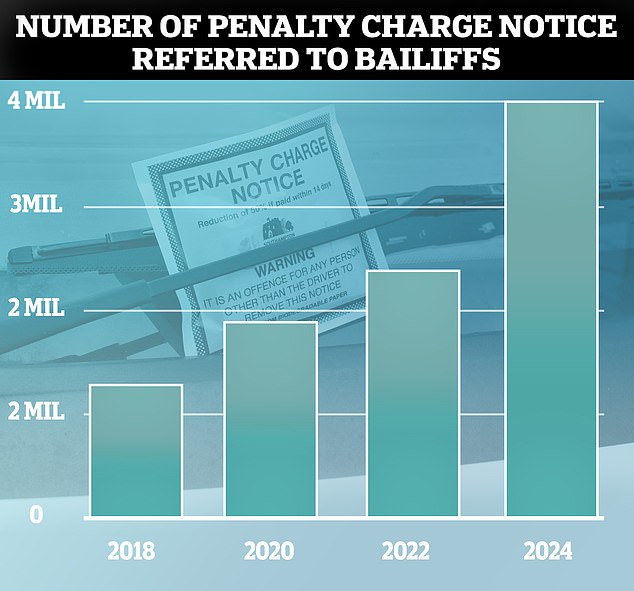Bailiffs sent by the council and knocking of the doors of motorists demanding payment for unpaid traffic fines has doubled since the pandemic, figures say.
The number of bailiffs sent to the homes of drivers has doubled since the pandemic,new figures reveal.
Four million penalty charges for road offences were passed onto enforcement agencies in 2023-24,up from 2.4m in the year prior and 1.9m in 2019-20.
The surge has been partially attributed to the rise of clean air zones,such as London's controversial ULEZ,but bailiffs have also blamed 'selfish' drivers deliberately ignoring the rules of the road.
It comes after a spare of videos appeared on social media showing drivers arrogantly using bus lanes as a VIP lane,and parking clearly on double yellow lines.
The Civil Enforcement Association gathered the most recent data from organisations working in collaboration with local authorities.

This comes after recent figures emerged that councils are struggling to fill the gap in public funding (Pictured: a bus lane)
The carer appealed claiming she did not see any signage for a toll but the council reject it - and her childhood friend took their own life shortly after.
'It made me very poorly,mentally very poorly,and I wasn’t in the right place at all to be dealing with [the PCN],' she added.
'Obviously,my own fault,I should have gotten back a bit quicker and the next thing we received another fine.'
A spokesperson for the Local Government Association said: 'Councils strive to ensure they have fair collection and enforcement policies and we agree that bailiffs should only ever be used as a last resort.
'If any motorist believes they have been fined unfairly,then they have the right to appeal against it.
'Money raised from fines and charges is used for running parking services,with any surplus spent on essential transport improvements,including fixing the £16.3 billion road repairs backlog,reducing congestion,tackling poor air quality and supporting local bus services.'
A British Parking Association spokesperson said: 'Local Authorities now manage a wider range of traffic related schemes than ever before.
'These range from on and off street parking to banned turns,school clearways,bus lanes and clean air zones. This naturally means that there will be an overall increase in enforcement activity.
All Local Authorities take enforcement seriously and endeavour to make sure they are acting within statutory guidance whilst providing those issued with a Penalty Charge Notice (PCN) information about how to pay and how to appeal.
'However,the BPA believes that changes are needed to make the system work more efficiently in England.
'This includes increasing the value of the PCN in order to ensure it acts as an effective deterrent,as has happened in Scotland to positive effect.
'There is growing evidence that the deterrent effect has diminished over time,enabling a small,but problematic minority,to act with impunity when it comes to parking and driving behaviour.'
New York TimesULEZ

© Voice Of Zimbabwe Privacy Policy Contact us